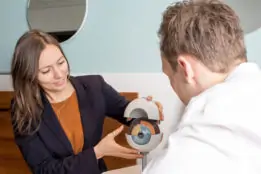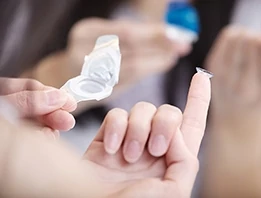Are Your Glasses and Contacts Creating Vacation FOMO?
A new poll has revealed that half of bespectacled Americans missed out on at least one activity from their vacation because they wear glasses or contacts. The survey of 2,000 Americans who wear glasses or contacts and travel found that they missed out on activities while traveling including watersports (24%), physical activities (13%), and going to the pool (13%).
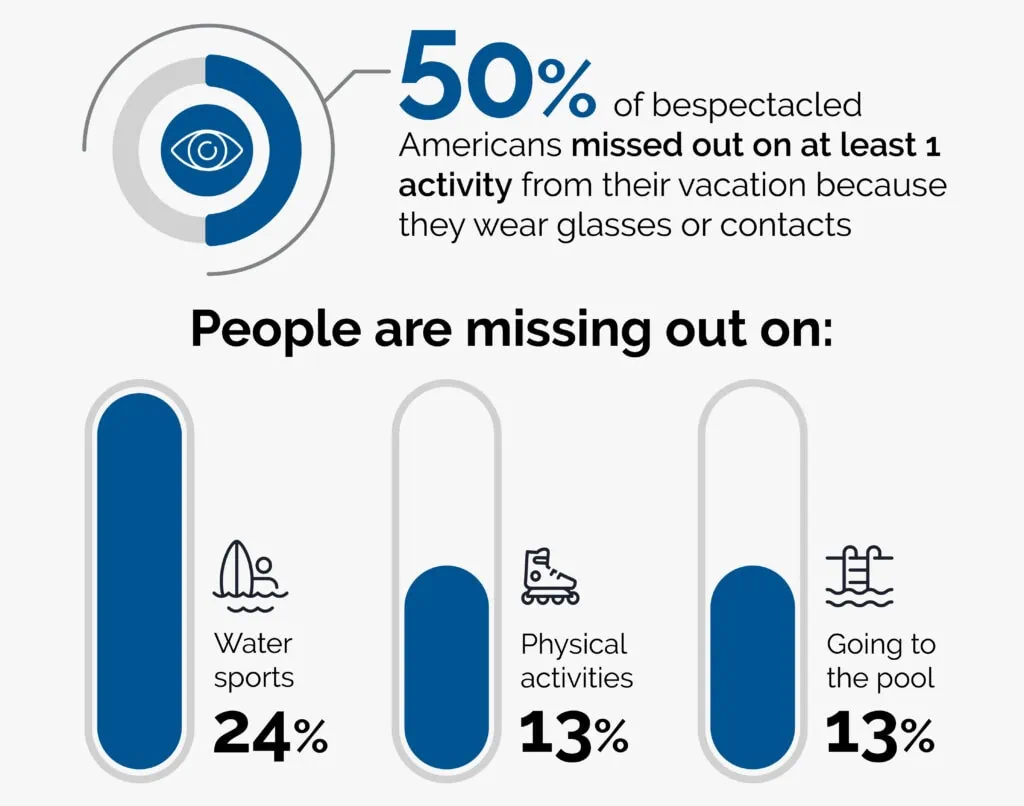
As a result, 17% base their travel decisions around the fact that they wear glasses or contact lenses.
Commissioned by the Refractive Surgery Council and conducted by OnePoll, the study found one-third of travelers who rely on vision correction to see, choose to forego their glasses and contacts entirely while traveling, simply because they’re worried it would compromise their experience. Nearly as many (32%) admitted they would enjoy traveling more if they didn’t need their eyewear.
“For people who need to rely on glasses and contact lenses while traveling, they make compromises they may not even be aware of that can diminish the overall experience – from the activities they choose to where they visit,” said William Wiley, M.D. medical director of the Cleveland Eye Clinic and Clear Choice LASIK Center, who also currently serves as president of the American-European Congress of Ophthalmic Surgery. “These travelers’ issues go beyond the extra pairs of glasses, contact lenses, cases, and daily supplies they bring in their luggage to really impacting their travel and, potentially, their eye health.”
The survey also asked respondents how they navigate their travel plans with eyewear. It found eyeglasses were found to be the “top must-have” for 78% of respondents, followed by portable chargers (51%) and prescription sunglasses (24%).
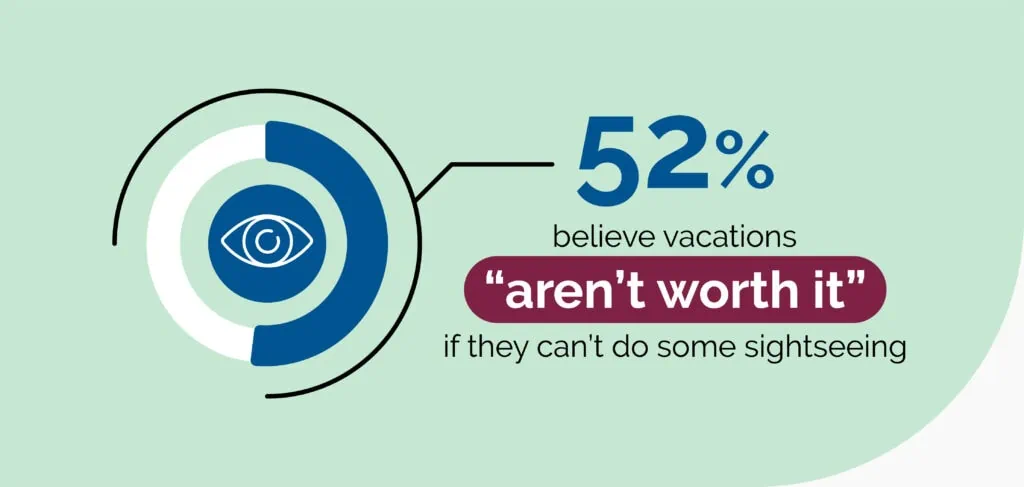
Other popular activities included eating local cuisine (37%), relaxing (33%), and making new memories (29%).
Fifty-five percent go without their glasses or contacts if they’re in a pool or the ocean. Alarmingly, 28% would keep their glasses on and 23% would keep their contacts in.
“Travel has been a top priority for many these past few years,” said Dr. Wiley. “And while seeing and experiencing new sights is important to invigorating our senses – especially vision – travelers also need to be sure to practice good hygiene and not compromise eye safety because contact lenses aren’t recommended in the pool, the ocean or other types of open water.”
Survey Findings Point to Vision Correction Options for Better Travel Experiences
A third (36%) said they worry about breaking their glasses or losing their contacts while on vacation and 37% said it has actually happened to them. Of those who have had a traveling mishap, 66% have considered a vision correction procedure such as LASIK, SMILE or ICL.
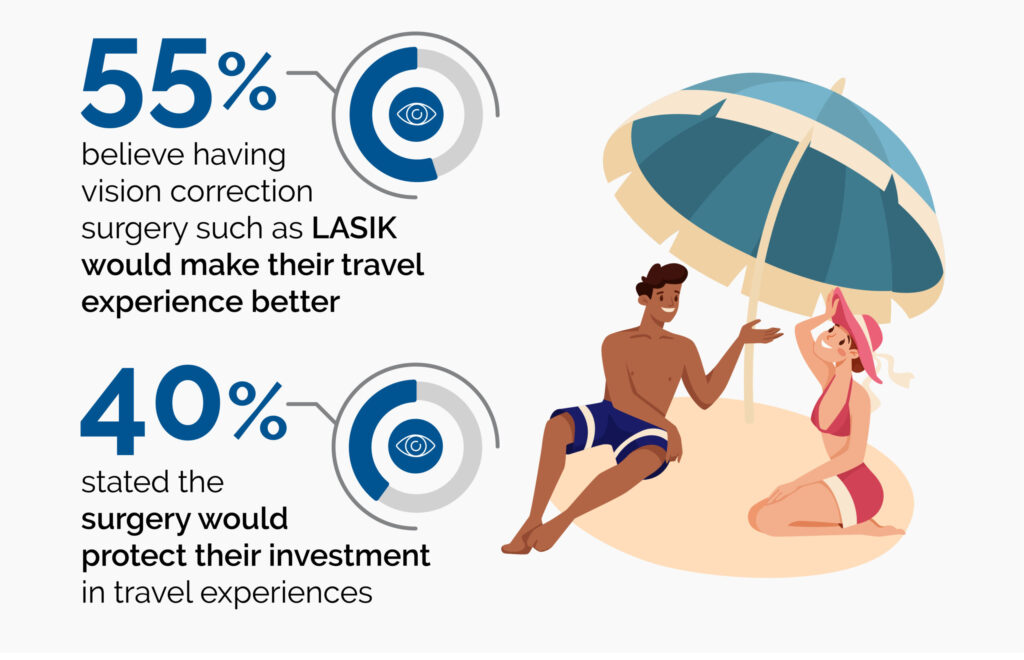
The average glasses wearer owns two pairs of glasses and brings both with them while traveling or on vacation. Meanwhile, contact wearers bring – on average – three extra pairs with them while traveling. And, for people who need corrective lenses to see, that’s not all they bring with them on vacation. The survey found that half of their top priority packing items were related to their need for vision correction.
Top 10 Packing “Must-Haves” (When You Need Glasses or Contacts)
- Eyeglasses – 78%
- Portable charger – 51%
- Prescription sunglasses – 24%
- Sunscreen – 21%
- Contact lens supplies – 21%
- Eyeglass case – 20%
- Hand sanitizer – 15%
- Water bottle – 14%
- Travel-size shampoo/conditioner – 14%
- Artificial tears or eye drops – 12%
If you’ve been disappointed or missed out on a memorable experience because you can’t see well without glasses or contact lenses, it is time to talk to your eye doctor about your vision correction options. Today, there are many different types of vision correction surgery – which means more people than ever can choose not to compromise between their ability to see well and their desire to fully engage in the experiences traveling can offer. A board-certified ophthalmologist with specialized training in vision correction procedures, also known as a refractive surgeon, can help you find the right choice for your vision and lifestyle. To find one in your area, visit our surgeon locator here.


